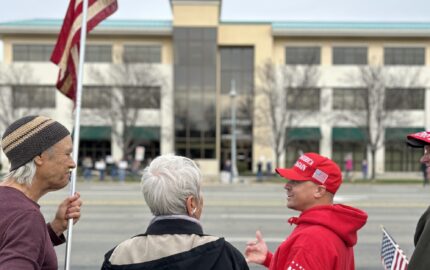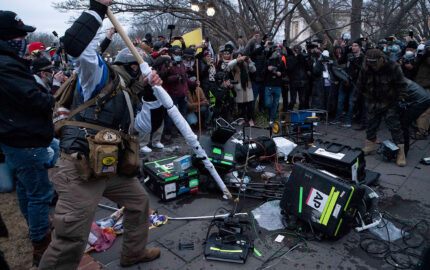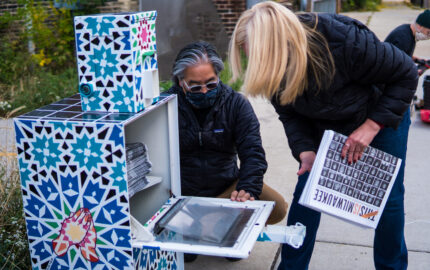As the election grows closer, the rigor of our reporting and the depth of the analysis we must provide for voters in Michigan has never been greater. Even as Covid-19 rages on and news interrupts — a plot to kidnap our governor, no less — we have a clear goal in mind:
No surprises on November 3.
We need to make sure we thoroughly understand the electorate of our diverse and vast state and have reported with all the nuance we can muster. We need to be prepared to understand the ramifications of possible outcomes before the outcome is known.
Our reporting has included recent take-outs on President Trump’s trouble retaining suburban women voters. It has also included how Michigan farmers are sticking with Trump, despite the impact of tariffs. We have much more enterprise and in-depth reporting to come before Election Day.
Our three reporters who regularly cover politics — in Detroit, Lansing, and Washington, D.C. — are engaged on a daily basis. In addition, we have re-tasked two additional veteran reporters in an effort to help amplify that coverage — one devoted to vote counting and the ability of the state to handle the massive surge in absentee voting; the other, a gifted storyteller, dedicated to telling why voters feel the way they feel this time around.
We have a Report for America reporter, who in partnership with PolitiFact, is doing fact check after fact check, especially on our close U.S. Senate race. And we just received two outside grants — one from the American Press Institute to hire a reporter to cover disinformation, and two fellows funded by Hearken’s Election SOS Fellowship to help us on matters related to disinformation and social media.
Because of Michigan’s position as a swing state we have the candidates and their surrogates in town day in and day out. We cover them just in case something newsworthy happens. Our USA TODAY Network partners around the state (from Holland in the west to Petoskey in the north, and others) are making a big difference.
It’s also important we engage in relentless truth-telling. When the president held a rally in Michigan in September and made claims about how he had helped the auto industry, this was the top of our story:
FREELAND, Mich. — President Donald Trump made wildly inaccurate claims at a rally outside Saginaw on Thursday night, suggesting he has revitalized auto manufacturing in the state when it actually lost jobs even before coronavirus hit in March.
“We brought you a lot of car plants, we brought you a lot ... and we’re going to bring you a lot more,” Trump began his speech at MBS International Airport in Freeland.
But only one new major assembly facility, a Jeep plant on Detroit’s east side, has been announced during Trump’s term, while General Motors underwent a divisive 40-day strike last year and announced the idling of four U.S. plants, including two in Michigan. One of those, Detroit-Hamtramck, has since been revived and is being retooled to build electric cars and SUVs. Warren transmission was revived most recently to make face masks, though its future is uncertain.
Our auto writers jumped in to make sure we had the necessary context to factually explain how the president was taking liberties with his claims.
I believe this is as important an election as we have had in my lifetime. (I was born during the first Eisenhower term.) Journalists must be truth-tellers. Call out the falsehoods, from any candidate. Do the fact-checking in real time.
We aren’t trying to cover the national race on a daily basis, though the president is constantly and inevitably injecting himself into the state’s business. He called Governor Gretchen Whitmer “that woman from Michigan” and didn’t react well to the governor tying the plot against her to his rhetoric. And, of course, the president took credit for Big 10 football returning — kind of a big deal in Michigan.
It also is our responsibility to explain that we are dealing with an election in a time unlike any other in recent memory, and we likely will not know the outcome on election night.
The secretary of state said she doesn’t expect results to be fully known in Michigan until Friday of election week. The governor has been more optimistic on the timing. In any case, this is an essential part of our reporting and we also will discuss this in explanatory columns in our Sunday Opinion section.
Absentee voting here is crushing past records and, so far, as is the case across the country, likely will favor the Democrats. So, we may see a “red wave” in returns that are counted on election night, but not sustained as the absentees are tabulated. We’ll also be closely tracking whether African-Americans turn out in greater numbers than they did four years ago. We’ll also be looking for cases of voter fraud, though there is no evidence or reason to expect it will happen. We will be watching polling places for intimidation or unlawful interventions.
Most of all, we’ll be looking at county and city officials across the state as they deal with the crush of absentees. It already is the biggest story of this election here (short of who wins) and will be.
Peter Bhatia is editor and vice president of the Detroit Free Press and freep.com.



